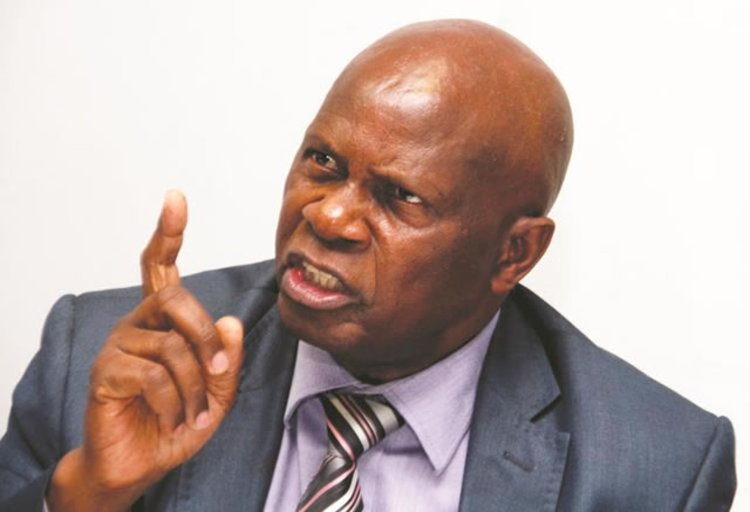IF there is anything critical to come out of Finance minister Patrick Chinamasa's lacklustre mid-term fiscal policy review statement in parliament yesterday, it is the grim reality that government is precariously living beyond its means and is now stuck in a deep fiscal crisis.
What is most surprising, though, is not just that it is trapped in a deep financial hole and continues with a business-as-usual approach towards the problem, but worryingly that it persists digging; irretrievably sinking deeper.
Besides being a scary fiscal calamity, that in itself is a major reflection of failure.
It is unbelievable government continues on a spending spree against this backdrop. Authorities carry on buying themselves top-of-the-range cars, gallivanting around the world and drawing huge allowances at the expense of service delivery and the public welfare. Officials are also looting public funds. They are now merciless parasites sucking dry the blood of suffering corporates and taxpayers.
Despite the deepening financial crisis, government is continuing with its reckless spending orgy - with President Robert Mugabe's office leading the way overspending by US$43 million - as its unsustainable budget deficit scaled almost US$1 billion in 2016.
This comes as Zimbabwe's total debt, as at end December 2016, quickened to US$11,3 billion; with the external debt at US$7,3 billion, and domestic debt US$4 billion. This is over 80% of the country's US$14 billion GDP.
Government's profligacy — which led to a massive US$900 million budget deficit — and a revenue shortfall of US$347,8 million, forced Treasury to borrow US$1,4 billion on the domestic market, crowding out the private sector which needs credit to invest and create jobs.
Showing fiscal indiscipline and irresponsible financial management, government spent US$4,9 billion under a US$4 billion national budget, hence a US$900 million deficit. It collected US$3,5 billion from taxes, reflecting an overall revenue shortfall of US$347,8 million.
Operating without its own currency and hence lack of monetary sovereignty and associated quantitative easing options in an imploding economy, government is now relying on issuing Treasury Bills (TBs) and bonds to cover its widening budget deficit amid a liquidity crunch and cash crisis. Of the US$2,1 billion TBs and bonds issued in 2016, US$356,3 million — about 40% — financed the budget deficit, while US$1,7 billion paid outstanding legacy debt.
Although government has been honouring its obligations upon TBs maturity, as demonstrated by a total of US$1,1 billion repaid timeously, fears of defaulting as the deficit widens are mounting. This puts banks, which hold huge TB stocks, at risk. Once the government defaults, the wheels will truly come off.
Mugabe is not leading by example as usual. He overspent on travel by US$23 million. His budget was US$30, but he spent US$53 million on largely futile foreign trips. Overall, his office had a US$43 million budget overrun.
The Defence ministry overspent by US$88,2 million. The Ministry of Agriculture overshot its budget by a staggering US$772,1 million, largely due to the controversial command agriculture project whose funding is dodgy and opaque. Its budget was US$145 091 000.
Government also shelled out US$134 million in unbudgeted for expenditures towards capitalising technically insolvent state-owned enterprises and parastatals.
"Government has accumulated US$1,07 billion worth of supplier's and service providers arrears to a number of domestic creditors who delivered goods and services to various line ministries and departments," Chinamasa said.
"These relate to such utilities' obligations as those for water and rates, electricity, telephony and other ICT related services, among others."
This policy path remains unsustainable given that the wage bill accounted for 65,5% and 91,7% of overall budget expenditures and revenues in 2016 respectively.
While cabinet has approved some austerity measures to contain the crisis, the situation will not change unless government stops spending money it does not have. Something needs to be done — and done urgently — to prevent a fiscal implosion with disastrous consequences.
- the independent
 Concern over Masvingo black market
Concern over Masvingo black market  Kenya declares three days of mourning for Mugabe
Kenya declares three days of mourning for Mugabe  UK's Boris Johnson quits over Brexit stretegy
UK's Boris Johnson quits over Brexit stretegy  SecZim licences VFEX
SecZim licences VFEX  Zimbabwe abandons debt relief initiative
Zimbabwe abandons debt relief initiative  European Investment Bank warms up to Zimbabwe
European Investment Bank warms up to Zimbabwe  Young Investment Professional (YIP) Graduate Programme 2019
Young Investment Professional (YIP) Graduate Programme 2019 











 Young Investment Professional (YIP) Graduate Programme 2019
Young Investment Professional (YIP) Graduate Programme 2019
Editor's Pick